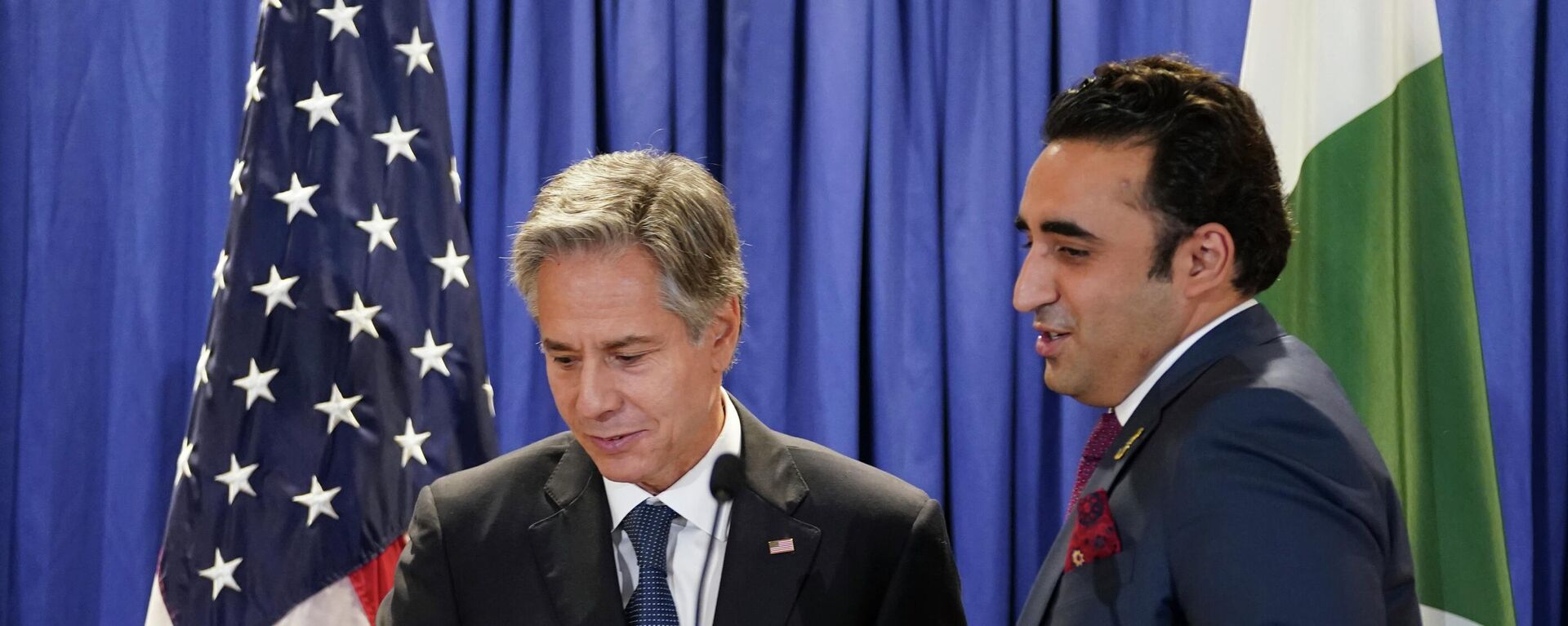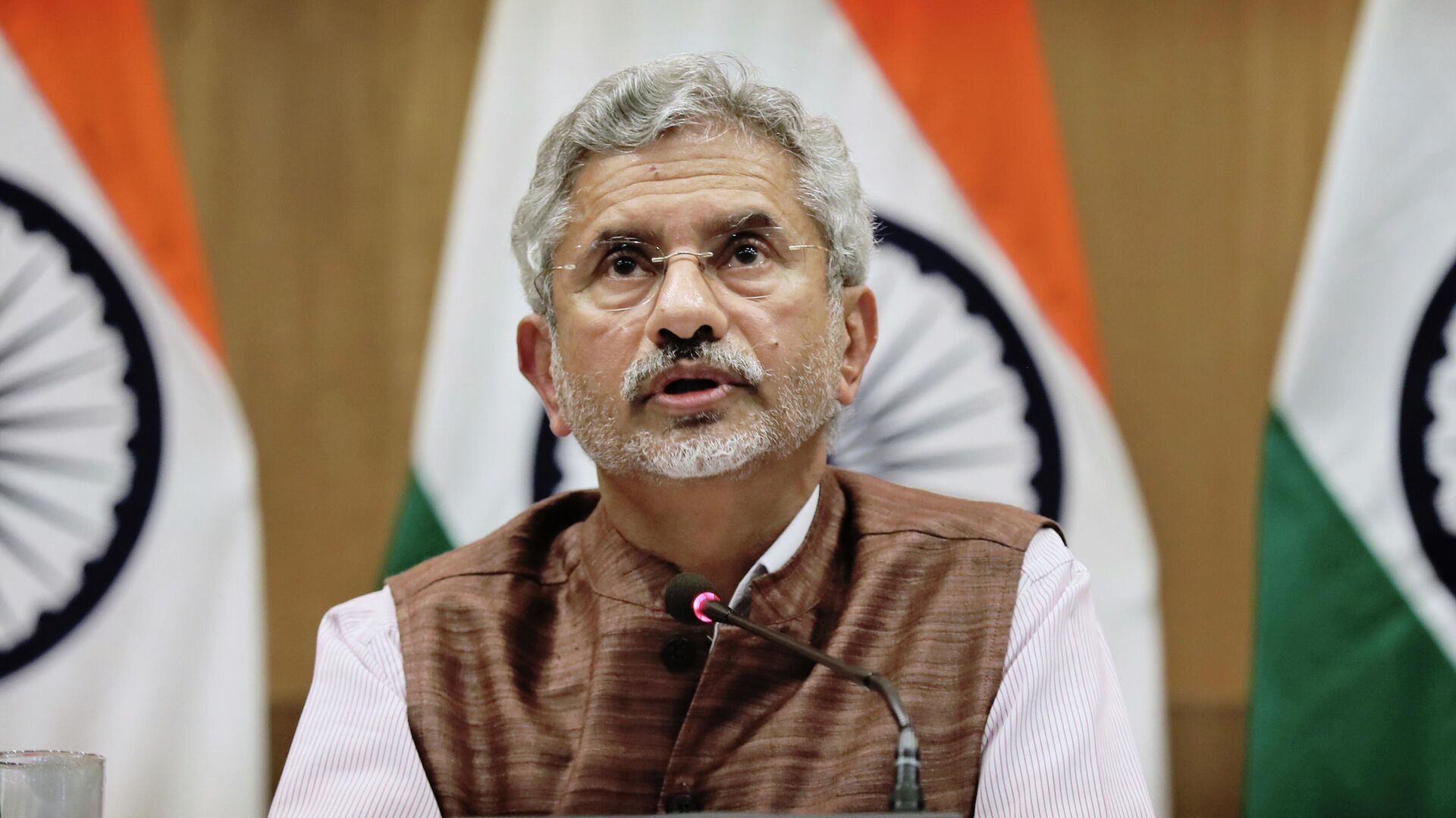https://sputnikglobe.com/20221010/india-slams-west-for-supplying-weapons-to-pakistan-for-decades-as-it-lauds-defense-ties-with-russia-1101665406.html
India Slams West for Decades-Long Supply Of Weapons to Pakistan as It Lauds Defense Ties With Russia
India Slams West for Decades-Long Supply Of Weapons to Pakistan as It Lauds Defense Ties With Russia
Sputnik International
Pakistan was a treaty ally of the US during the Cold War. Since 2004, it has transformed into a “major non-NATO ally” of Washington, playing a key role in the... 10.10.2022, Sputnik International
2022-10-10T06:42+0000
2022-10-10T06:42+0000
2022-12-08T18:02+0000
india
subrahmanyam jaishankar
us
stockholm international peace research institute (sipri)
ukraine
pakistan
https://cdn1.img.sputnikglobe.com/img/07e6/09/17/1101121544_136:0:3777:2048_1920x0_80_0_0_32bddf34f07d5b730c20f19f901acbad.jpg
India's Foreign Minister Subrahmanyam Jaishankar has said that New Delhi’s “long-standing” defense ties with Russia have expanded over years for a variety of reasons, including the policy of western governments to prefer Islamabad over India in defense transactions for several decades.“The western countries didn’t supply weapons to India and in fact considered the military dictatorship next to us as a preferred partner,” Jaishankar said in response to a question during a joint press conference with Australian Foreign Minister Penny Wong in Canberra on Monday.The top Indian diplomat concluded that the “relationship [with Russia] has certainly served our interests well”.The remarks come weeks after Jaishankar slammed the US for resuming foreign military sales (FMS) to Pakistan, as the Biden administration approved a $450Mln “sustenance package” for Islamabad’s F-16 fighter jet fleet for the purpose of “counter-terrorism”. Moscow has historically been India’s top supplier of arms and sophisticated weapons systems, a position it held until last year, according to a 2021 report on ‘International Arms Transfers’ by Swedish think-tank Stockholm International Peace Research Institute (SIPRI).However, defense ties between India and the US are relatively new, with military supplies from Washington to New Delhi increasing from zero in 2008 to almost $20Bln in 2020, according to the State Department.Since the beginning of the special military operation in Ukraine in February, New Delhi has consistently rejected calls by the US and other western allies to scale down its military and political ties with Moscow. The western powers have also sought to pressure New Delhi to vote against Russia on various Ukraine-related resolutions at the United Nations, a call India has ignored.Not only has New Delhi increased its strong relations with Moscow, it has also significantly scaled up its imports of Russian energy because of high fuel prices.Jaishankar also rejected the idea that New Delhi’s strong relations with Moscow were “holding back the Quad” group which comprises Australia, India, Japan and the US.“The Quad is a mechanism that focuses on the Indo-Pacific, where the convergences among Quad partners is particularly strong,” he said.
https://sputnikglobe.com/20221007/just-interested-in-selling-weapons-to-india-ex-envoy-on-us-enhancing-ties-with-pakistan-1101607560.html
ukraine
pakistan
Sputnik International
feedback@sputniknews.com
+74956456601
MIA „Rossiya Segodnya“
2022
News
en_EN
Sputnik International
feedback@sputniknews.com
+74956456601
MIA „Rossiya Segodnya“
Sputnik International
feedback@sputniknews.com
+74956456601
MIA „Rossiya Segodnya“
india, subrahmanyam jaishankar, us, stockholm international peace research institute (sipri), ukraine, pakistan
india, subrahmanyam jaishankar, us, stockholm international peace research institute (sipri), ukraine, pakistan
India Slams West for Decades-Long Supply Of Weapons to Pakistan as It Lauds Defense Ties With Russia
06:42 GMT 10.10.2022 (Updated: 18:02 GMT 08.12.2022) Pakistan was a treaty ally of the US during the Cold War. Since 2004, it has transformed into a “major non-NATO ally” of Washington, playing a key role in the so-called war on terror. The US State Department last month called for further “expanding” ties with Islamabad.
India's Foreign Minister Subrahmanyam Jaishankar has said that New Delhi’s “long-standing” defense ties with Russia have expanded over years for a variety of reasons, including the policy of western governments to prefer Islamabad over India in defense transactions for several decades.
“The western countries didn’t supply weapons to India and in fact considered the military dictatorship next to us as a preferred partner,” Jaishankar said in response to a question during a joint press conference with Australian Foreign Minister Penny Wong in Canberra on Monday.
Jaishankar underlined that the “merits” of the Russian defense systems over others available on the market was another reason for New Delhi to grow military ties with Moscow. “All of us in international politics deal with what we have. We make judgements which reflect our future interests as well as of the current situation," he said.
The top Indian diplomat concluded that the “relationship [with Russia] has certainly served our interests well”.
The remarks come weeks after Jaishankar slammed the US for resuming foreign military sales (FMS) to Pakistan, as the Biden administration approved a $450Mln
“sustenance package” for Islamabad’s F-16 fighter jet fleet for the purpose of “counter-terrorism”.
The Indian FM said these jets are mostly used on the border with India rather than for the stated purpose of being deployed in counter-terrorism operations.
Moscow has historically been India’s top supplier of arms and sophisticated weapons systems, a position it held until last year, according to a 2021 report on ‘International Arms Transfers’ by Swedish think-tank Stockholm International Peace Research Institute (SIPRI).
However, defense ties between India and the US are relatively new, with military supplies from Washington to New Delhi increasing from zero in 2008 to almost $20Bln in 2020, according to the State Department.

7 October 2022, 13:58 GMT
Since the beginning of the special military operation in Ukraine in February, New Delhi has consistently rejected calls by the US and other western allies to scale down its military and political ties with Moscow.
The western powers have also sought to pressure New Delhi to vote against Russia on various Ukraine-related resolutions at the United Nations, a call India has ignored.
Not only has New Delhi increased its strong relations with Moscow, it has also
significantly scaled up its imports of Russian energy because of high fuel prices.
Jaishankar reiterated his concerns about the effects of the Ukraine crisis during his press conference, as he noted that countries of the ‘Global South’ were particularly affected by the situation as they were grappling with surging fuel and food prices.
Jaishankar also rejected the idea that New Delhi’s strong relations with Moscow were “holding back the Quad” group which comprises Australia, India, Japan and the US.
“The Quad is a mechanism that focuses on the Indo-Pacific, where the convergences among Quad partners is particularly strong,” he said.


